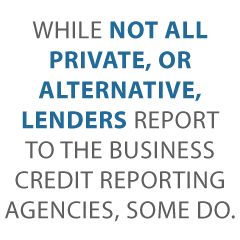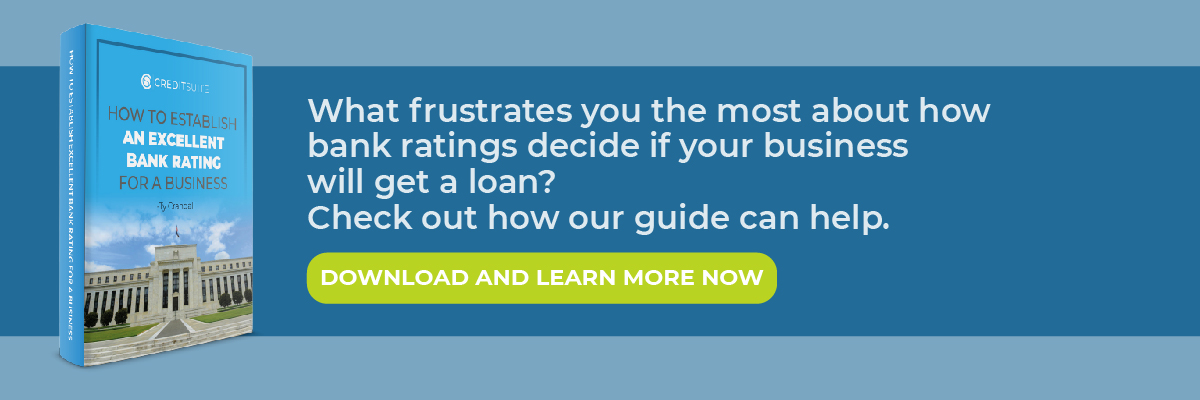Private business loans can be and excellent source of business funding. We’ve listed a few of our favorite options here. However, remember that details like approval requirements and interest rates can change without warning. Be sure to check with the lender to get the most current information.
How Private Business Loans Can Help Build or Improve Business Credit
The concepts of business credit and private business loans are new to many business owners. The terms are discussed more often now than they were 10 years ago. Still, many are unfamiliar with what they are and how they can play into the success of your business.
For many looking to start a business, they know no other way than to get started with personal loans on their personal credit. Others understand the concept of business credit, but are unsure how to get it. Then there are those that have found private loans, but aren’t sure how to best utilize them to build or improve business credit.
We hope to answer all these questions and more, specifically those relating to using private loans to build and improve business credit.
What Is Business Credit?
Business credit is credit that is in the name of your business. It isn’t connected to the business owner in any way. It is in the business name, the business contact information, and the business EIN rather than the owner’s SSN.
If you have business credit, you can use it to apply for funding for your business. The debt and the payments will not be on your personal credit report at all. The problem is, most traditional lenders rely on the personal credit score most heavily, even if a business does have business credit. This is where private business loans can be helpful.
What are Private Business Loans?
Private business loans are loans from companies other than banks, also called alternative lenders. Many of these have popped up in the past decade as entrepreneurship has become more prevalent. The need for a financing option from institutions other than traditional banks has encouraged this increase.
There a few benefits to using private business loans over traditional loans. The first is that they often have more flexible credit score minimums. Even though they still rely on your personal credit, they will often accept a score much lower than what traditional lenders require. Another benefit it that they will often report to the business credit reporting agencies, which helps build or improve business credit.
The trade off is that private business loans often have higher interest rates and less favorable terms. In the end though, the ability to get funding and the potential increase in business credit score can make it well worth it.
How Can You Use Private Business Loans to Improve or Build Business Credit?
While not all private, or alternative, lenders report to the business credit reporting agencies, some do. These are the ones you want to work with. As they report your on-time payments, your credit will grow. They must report to Dun & Bradstreet, Experian Business, Equifax Business, or some other agency that reports business credit. Otherwise it won’t work. Not all private lenders will do this. You have to ask.
There are some lenders that are known to report to the business credit agencies however.
Which Private Lenders Report?
As a general rule, you simply have to research lenders to determine whether or not they report to the business credit reporting agencies. Sometimes this is as simple as asking them who they report payments to. Here are a few that we know oft to get you started. Remember details such as minimum credit scores, interest rates, and more can change frequently. Always check with the lender directly for the most up-to-date information.
Fundation
Fundation offers an automated process that is super-fast. Originally, they only had invoice financing. Then they added the line of credit service. Repayments are automatic, meaning they draft them electronically. This happens on a weekly basis. One thing to remember is that you could have a repayment as high as 5 to 7% of the amount you have drawn, as the repayment period is comparatively short.
You can get loans for as little as $100 and as high as up to $100,000, but the max initial draw is $50,000. They do have some products that go up to $500,000. Though there is no minimum credit score requirement, they do require at least 3 months in business, $50,000 or more in annual revenue, and a business checking account with a minimum balance of $500.
Fundation reports to Dun & Bradstreet, Equifax, SBFE, PayNet, and Experian, making them a great option if you are looking to build or improve business credit.
BlueVine
The minimum loan amount available from BlueVine is $5,000 and the maximum is $100,000. Annual revenue must be $120,000 or more and the borrower must be in business for at least 6 months. Personal credit score has to be at least 600. It is also important to know that BlueVine does not offer a line of credit in all states.
They report to Experian. They are one of the few invoice factoring companies that will report to any business credit bureau.
OnDeck
With OnDeck, applying for financing is quick and easy. Apply online, and you will receive your decision once application processing is complete. Loan funds will go directly to your bank account. The minimum loan amount is $5,000 and the maximum is $500,000.
There is a personal credit score requirement of 600 or more. Also, you must be in business for at least three years. There is an annual revenue requirement of at least $100,000 as well. In addition, there can be no bankruptcy on file in the past 2 years and no unresolved liens or judgements.
OnDeck reports to the standard business credit bureaus.
The Business Backer
The Business Backer offers a product they call FlexFund Line of Credit. Funds range in amount from $5,000 to $240,000, and draws can be repaid on either a daily or weekly basis.
They report to Dun & Bradstreet and Equifax.
What Are Some Other Ways to Build Business Credit?
There are other ways to get accounts reporting on your business credit as well. One option is to look at the regular payments you make already. Do you pay rent? Do you pay telephone, internet, or utility bills? Ask your landlord and utility providers to report your payments to the business credit reporting agencies. Of course, they do not have too. However, some will if you ask. This is a way to get accounts reporting without taking on new debt.
Another option is to talk to merchants you already do business with. If you have been working with them for a while, there is a chance they will extend credit. Ask them if they will extend credit and report to the business credit agencies. Again, they may not do it, and they do not have to. It never hurts to ask though. You’ll never know until you do.
These two options are quick and easy ways to start to build business credit in addition to private business loans. There is another way however, and you can use it at the same time as you do the private business loan avenue. It’s called starter vendors.
How to Keep Building Business Credit
Once you have a private business loan or two, as well as some starter vendors and other merchants reporting, you need to keep an eye on your credit report. Credit monitoring is vital to the process of building business credit. Mistakes on your report can slow progress significantly. By looking at your credit regularly, you can see which accounts are reporting and ensure that the information being reported is accurate.
There are a few options when it comes to monitoring your business credit. Unlike personal credit monitoring, it isn’t free. However, we can show you how to do it for cheaper than what the credit agencies themselves will offer.
Improve Business Credit by Credit Monitoring with the Big Three
D & B provides Credit Signal, which is a means to track your credit score by having the reports come directly to you, for a price.
Equifax offers a risk monitoring service as well. It is convenient as it enables reports to come directly to you. If you don’t wish to pay for continual reports, you can submit an alternative request for a one-time Equifax report.
Experian provides similar services, with options for continual monitoring or one-time reports.
Prices for individual reports from each vary.
Save money by monitoring your credit on a regular basis with Credit Suite. We can help you monitor business credit at Experian, Equifax, and D&B at a considerable savings. See: www.creditsuite.com/monitoring.
What Do You Do with the Information?
Update the information if there are errors or the info is incomplete. At D&B, you can do this by going to: https:www.dnb.com/duns-number/view-update-company-credit-file.html. For Experian, to to:www.experian.com/small-business/business-credit-information. If you need to deal with Equifax, go here: www.equifax.com/business/small-business.
If there are inaccuracies in the credit information, you need to dispute them. Errors in your credit report(s) can be fixed. However, credit agencies normally want you to dispute in a particular way.
Disputing credit report mistakes generally means you send a paper letter with duplicates of any supporting documents like receipts or cancelled checks. Never mail the original copies.
Dispute errors on your small business’s Equifax report by following the directions here.
You can dispute inaccuracies on your business’s Experian report by following the directions here: www.experian.com/small-business/business-credit-information.
For D&B’s PAYDEX Customer Service, use the phone number is here: www.dandb.com/glossary/paydex.
You Can Build and Improve Business Credit with Private Business Loans
Private business loans can definitely help you build business credit. However, you must choose lenders that will report your payments to at least one business credit agency. There are more that what we have listed. Be sure to do your own research to find the best options for your business.
Private business loans are just one tool to help you build business credit. There are many tools that you can stick in your tool box that will help you along the way. The vendor credit tier is one, but you can also ask those providers that you already make payments to if they will report. This can help you build business credit even faster.





